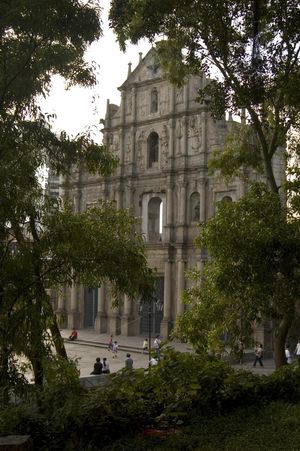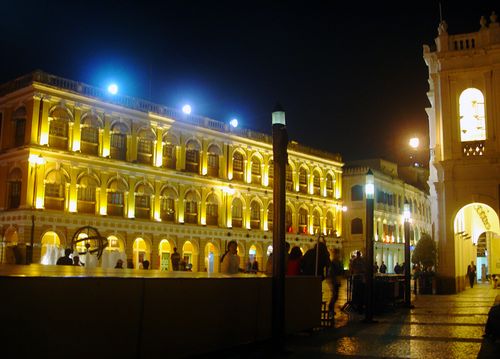|
|

Facade of St Paul's Church |
|
Macau is repository of rich Chinese traditions and heritage. It embodies the convergence of the oriental occidental cultures that are evident within the classic architecture of traditional Chinese temples and centuries-old Portuguese fortresses. The ancient art forms of Macau are still visible amidst the panels of terra cotta and Eastern motifs carved on some facades of hotels and other private accommodations. Off late the city has developed as a major tourism destination. Visitors often prefer to stay at cheaper bed and breakfasts or hostels to save for gambling at the world famous casinos of Macau. Otherwise, tourists can also look out for the beautiful houses around the picture-perfect gardens and squares of the city, which are often let as ‘apartments for rent’.
Macau may fall short of the glamour and glitter of Hong Kong but restores its distinction with paramount natural beauty.
The mainland of Macau consists of mainly two islands, Taipa and Coloane. It rests between the estuary of Zhujiang or Pearl River on the east and the Xijiang or West River on the west. Located on the south coast of China, Macau is attached to the Zhuhai Special Economic Zone of the Guangdong Province. The total land area of Macau is approximately 23.6 sq km and keeps increasing due to continuous process of land reclamation for high population rate. It is one of the most densely populated regions in the world that provides accommodation to more than 482,000 people. The majority of the populace is Chinese while Portuguese and other European communities make up the minority. The landscape of Macau is basically flat and fertile with occasional spurts of hilly regions that reach the highest point at Coloane Alto with height of 174 metres. It experiences subtropical climatic conditions where the summers are excessively hot and humid and the winters are moderate. Macau is vulnerable to tropical storms and typhoons.
Macau was known as the Panyu County under Chinese rule until it became a Portuguese trading point in mid-sixteenth century. Macau fought out the Dutch invaders several times and never bowed down to the Spanish attackers at mainland Portugal. This brought in the title "There is none more Loyal" to Macau from the Portuguese authorities. Macau was thus established as the oldest European outpost in China. Following the Agreement of 1987, it became a special administrative region under Chinese sovereignty in December 1999. From then on, Macau has been privileged with 50 years of non-interference in its economic and social structures. Hence, the region is denoted as the Macau Special Administrative Region of the People's Republic of China.
 Senate Square
Senate Square
|
Macau is well positioned as a preferred entry point to the China market and the Macau International Airport is an attractive alternative for the region's increasing airfreight traffic. These advantages along with profits from the textile, fireworks, electronics and toy industries helped the country sustain its growth rate in the face of stiff competition from Hong Kong. However, it is tourism and gambling sector that serve as the mainstay of the Macanese economy.
The political structure of Macau follows the pattern of Portuguese law and is headed by a chief executive. The chief executive is selected by an electoral body of People’s Republic of China and he functions with his set of cabinet members or the Executive Council. The 29-member, strong unicameral Legislative Council or LEGCO serves as the law making body of the region. The Court of Final Appeal heads the judiciary organ in Macau Special Administrative Region.
|
|

